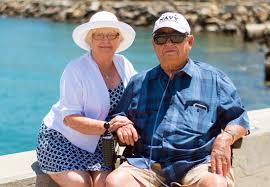The entire world’s elderly population has been growing rapidly. By 2050, there will be 2 billion seniors living on the planet. It’s important to be in a place that will be comfortable for you as you age. Here are the top 18 countries to live in when you’re old.

Top 18 Countries to Live in When You’re Old
In August, a team of researchers and policy experts from the US and Singapore, ranked 28 countries on a scale called the Aging Society Index. It gives countries a score out of 100 based on different factors that show how well elderly are supported. Here are the top 18.
1. Norway— Score of 65
2. Sweden—Score of 62
3, United States—Score of 60
4. Netherlands—Score of 60
5. Japan—Score of 59
6. Ireland—Score of 58
7. Denmark—Score of 58
8. Germany—Score of 55
9. Finland—Score of 53
10. Spain—Score of 52
11. United Kingdom—Score of 50
12. Austria—Score of 43
13. Belgium—Score of 37
14. Italy—Score of 35
15. Slovenia—Score of 33
16. Estonia—Score of 31
17. Poland—Score of 31
18. Hungary—Score of 23
How These Countries Were Ranked
The team worked with 18 of the 35 countries that are part of the Organization for Economic Cooperation and Development. The index scores are based on 5 factors that represent different parts of a person’s life.
Productivity and Engagement
How many opportunities are there for seniors to contribute to society? This was calculated by retirement age, employment over 65, volunteer hours over 65, and informal educational opportunities.
Well-Being
This is a measure of quality of life. This was calculated by life expectancy and surveys reporting life satisfaction over 50.
Equality
How fair is life to the elderly? This is calculated by the Gini index that looks at poverty risk, food security, education opportunities for both young and old.
Cohesion
How socially supported are elderly people? This is based on financial transactions between older and younger groups, the number of older people living with younger people, and surveys regarding younger people’s feelings towards older generations.
Security
A measure of the physical and financial security given to older people. This is based off income, pension wealth, physical safety, and external government debt.
The team asked a group of 14 specialists including geriatricians, sociologists, and economists to weigh each of the categories based on their importance.
Read more about the rankings here.

